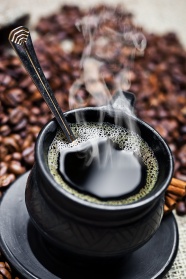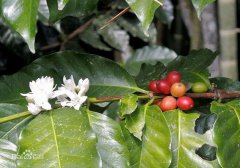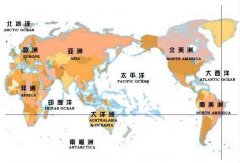Introduction of fine Tanzanian coffee beans the price of Tanzanian coffee beans
Gourmet coffee has soft acidity and attractive aroma, which is absolutely worth enjoying.
Coffee exports from Tanzania (Tanzania) play an important role in the whole national economy. Bean-shaped berry coffee is very productive and is said to be more fragrant than ordinary coffee. Generally speaking, the coffee beans in Tanzania have an extraordinary quality. For example, the fine Tanzanian AA coffee (Chagga AA), produced in the Moshi district near Mount Kilimanjaro, is famous for its full-grained and fragrant quality.
Due to political instability and rampant diseases and insect pests, the coffee industry in Tanzania has been damaged, resulting in a decline in the overall level of coffee and instability in quality, which in turn lead to lower prices, which is usually the result of a further decline in the coffee industry. What's more, it is estimated that more than 12% of the Arabica coffee grown in northern Tanzania from 1969 to 1985 was smuggled into Kenya. Recently, however, the country's coffee industry has shown signs of improving. Although the process of improvement is slow, it is still encouraging because, after all, the quality of coffee in Tanzania is excellent.
In the past, the coffee industry in Tanzania has been dominated by manor cultivation, but now more than 85% are grown by small farmers. Many small farmers are combined into cooperative organizations, the most important of which is the Kilimanjaro Cooperative Alliance (Kilimanjaro Cooperative Union, referred to as KNCU). Tanzanian coffee is sold by the Tanzanian Coffee Management Council (Tanzanian Coffee Marketing Board, TCMB) to private exporters by auction. In the 1980s, most coffee sales in Tanzania changed from auctions to being sold directly to the Coffee Management Committee of Tanzania, and the coffee industry is being reformed to allow individuals or groups to buy coffee in the future. at that time, coffee will have to be graded in different ways in order to attract buyers from Germany, Finland, Belgium and Japan.

Important Notice :
前街咖啡 FrontStreet Coffee has moved to new addredd:
FrontStreet Coffee Address: 315,Donghua East Road,GuangZhou
Tel:020 38364473
- Prev

Ethiopian Harald G4 | Harald coffee is dried naturally.
Ethiopian Harald G4 | EthiopiaHarrar Grade4 Harald coffee is cultivated by natural drying between 1800m and 2500m above sea level and exported to countries around the world through the city of Dire Dawa. Because of its high popularity and low production, the price is high relative to its grade, and it is one of the most beloved premium coffee in the world.
- Next

The most recognized Arabica coffee in the world, the indispensable coffee is Ken.
Kenya AA | Kenya AA in the world's recognized, the most advanced Arabica coffee series, the indispensable coffee is Kenya AA. The AA here refers to raw beans.
Related
- Does Rose Summer choose Blue, Green or Red? Detailed explanation of Rose Summer Coffee plots and Classification in Panamanian Jade Manor
- What is the difference between the origin, producing area, processing plant, cooperative and manor of coffee beans?
- How fine does the espresso powder fit? how to grind the espresso?
- Sca coffee roasting degree color card coffee roasting degree 8 roasting color values what do you mean?
- The practice of lattes: how to make lattes at home
- Introduction to Indonesian Fine Coffee beans-- Java Coffee producing area of Indonesian Arabica Coffee
- How much will the flavor of light and medium roasted rose summer be expressed? What baking level is rose summer suitable for?
- Introduction to the characteristics of washing, sun-drying or wet-planing coffee commonly used in Mantenin, Indonesia
- Price characteristics of Arabica Coffee Bean Starbucks introduction to Manning Coffee Bean Taste producing area Variety Manor
- What is the authentic Yega flavor? What are the flavor characteristics of the really excellent Yejasuffi coffee beans?

